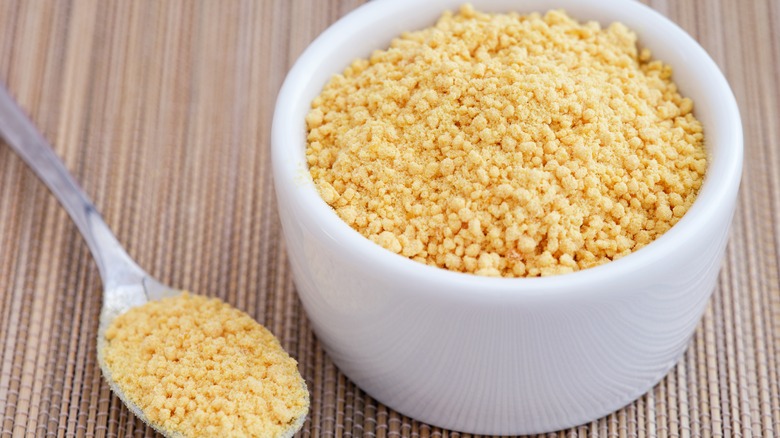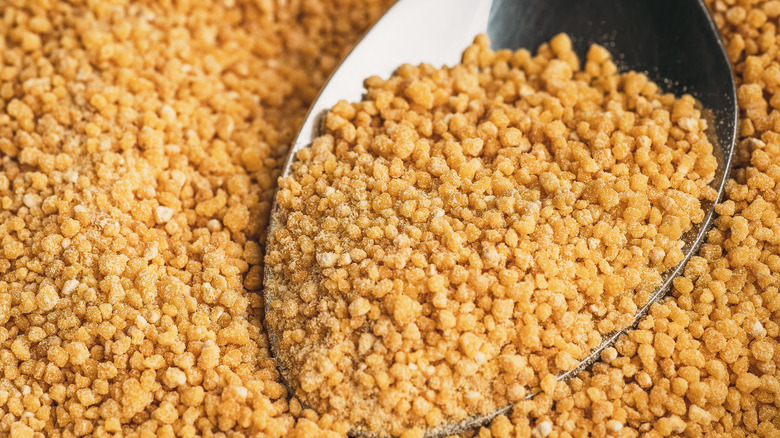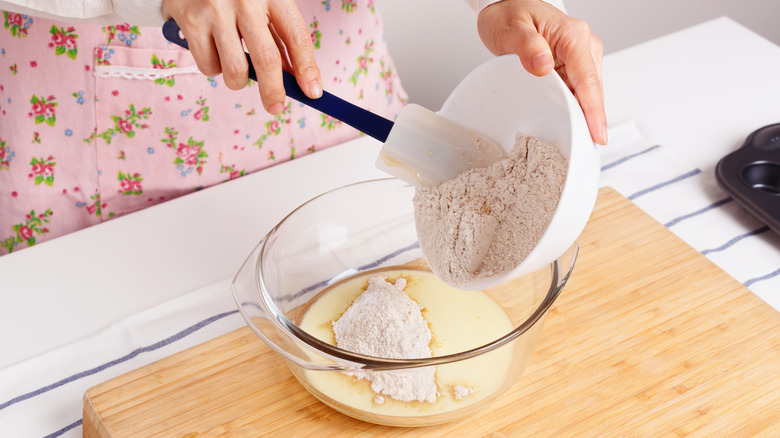Here's Why You Should Avoid Foods With Lecithin If You're Vegan
Lecithin is commonly used as a food additive in whey protein shakes, frozen desserts, salad dressings, cake mixes, and other products. You may also find it in cocoa powder, spreads, chocolate, and baked goods. This compound acts as an emulsifier and thickener, improving food quality. What's more, some brands are certified kosher or halal, says the International Food Additives Council (IFAC).
From a chemical standpoint, lecithin is a phospholipid consisting of several chemicals, such as phosphatidylcholine. After ingestion, it's converted to choline, a nutrient that supports brain function, explains the University of Rochester. For this reason, lecithin supplements are used in the treatment of dementia, but there's not enough evidence to confirm their benefits. However, these products — especially those containing soy lecithin — may improve blood lipids and lower bad cholesterol, notes a 2017 review featured in the journal Nutrients. Some studies also suggest that lecithin may help with inflammation in people with ulcerative colitis, according to clinical research published in Digestive Diseases.
This multipurpose ingredient is found in a wide range of foods, supplements, and cosmetics, from body lotions to protein bars, but not all lecithin is the same. If you're a vegan, you might want to think twice before using it in recipes or buying products that contain lecithin.
Lecithin may not be vegan-friendly
Lecithin was first identified in egg yolks in 1846, according to the IFAC. This fatty substance occurs naturally in soybeans, corn, sunflower, and other plants, but it's also found in animal tissue, such as organ meats. The most common variety is soybean lecithin, but there are some concerns regarding its allergenic potential. A safer alternative is sunflower lecithin, which can be used in vegan butter, chocolate, baked goods, and other products, explains Food & Beverage Insider.
Soy, corn, and sunflower lecithin are vegan-friendly, but some food products contain egg yolk lecithin. Additionally, plant-based lecithin may be processed in facilities that also handle eggs, bovine gelatin, and other animal ingredients. Common beauty products like facial creams, foundation, lipstick, mascara, shampoos, and tanning oils may contain this ingredient, too — and sometimes, manufacturers use egg yolk lecithin, according to the Environmental Working Group.
The best thing you can do is check the nutrition label and ingredient list when trying new foods or beauty products. Make sure the label says "100% vegan" or something similar. Ideally, choose products with The Vegan Trademark, which ensures they contain no animal ingredients.
Are there any vegan alternatives to lecithin?
Soy lecithin is a popular choice among vegans, but it may trigger allergic reactions. Plus, it has estrogen-like effects and, therefore, can throw your hormones out of balance, reports a 2011 study published in Food and Chemical Toxicology. On top of that, lecithin — regardless of its source — can upset your stomach, warns the University of Rochester. Sunflower lecithin is less likely to cause allergies, but you may have a hard time finding it in stores.
Luckily, there are plenty of alternatives to this common food additive. For example, you may use guar gum, a thickening agent derived from beans. WebMD recommends adding it to pasta, cakes, fried foods, and sauces. Another option is xanthan gum, a stabilizer and thickener produced through fermentation. It works best in gluten-free pasta, homemade bread, and baked goods.
An even better choice is ground flaxseed, which can be used as a food binder and thickener. Rich in fiber and healthy fats, it keeps your digestive system running smoothly and could protect against heart disease, notes the Mayo Clinic. To reap the benefits, add ground flaxseed to homemade pancakes, muffins, oatmeal, salad dressings, and sauces. Alternatively, buy whole flaxseeds from your local grocery store and grind them before use — just remember to consume them in moderation.


